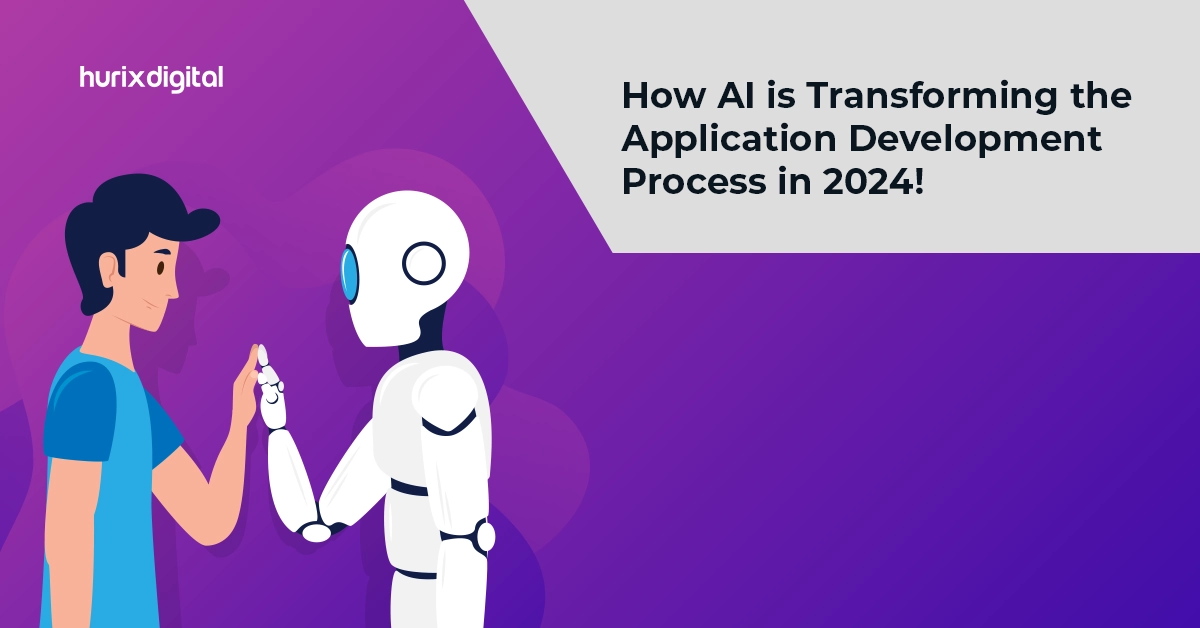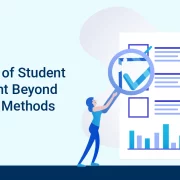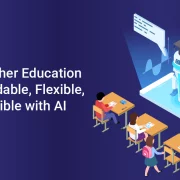
How AI is Transforming the Application Development Process in 2024!
Summary
This blog explores the impact of AI on application development. Learn how AI is streamlining development processes and driving innovation in software creation.
The digital landscape is undergoing a seismic shift. 35% of companies already use AI in their operations while the rest aim to implement such tools in the future. Its market size is expected to hit $407 Billion by 2027. AI (Artificial Intelligence) is no longer a buzzword but has emerged as a game-changer in software development. Developers use its potential to automate mundane tasks. It helps refine codes with meticulous precision and dramatically accelerates the development lifecycle. It is like an industrious assistant who frees developers for more intricate and imaginative aspects of their work.
However, harnessing this transformative power in 2024 demands a deeper understanding. Keep reading to delve into the heart of AI’s impact to explore its secrets and practical applications. Let us discover how AI-powered algorithms streamline coding, automate repetitive tasks, and optimize codebases for peak performance. Witness how the combination of human ingenuity and AI’s computational mastery increases efficiency, elevates user experiences, and paves the way for a future where intelligent software reigns supreme.
Table of Contents:
8 Ways AI is Supercharging App Development in 2024
Let us explore the top 8 ways in which Artificial Intelligence is transforming the application development process in 2024:
1. Generates Automated Code
A game-changing superpower of AI in application development is that it generates automated codes. It analyzes your existing code and churns out pre-written snippets according to your needs. It helps save time by implementing features faster and reduces pesky typos to keep your code clean with consistent formatting.
However, adapting AI-generated code to complex projects can be tricky, and debugging will require special testing. AI programming tools come to this aid by understanding your natural language requests and existing codebase to suggest relevant code snippets.
2. Offers Predictive Analytics
As the name suggests, AI offers predictive analytics, which gives insights about the future of your app.
By scrutinizing historical project data, AI-powered apps reveal hidden patterns, predict bugs, and even estimate the lines of code your team will produce. This foresight is a godsend for developers, enabling them to allocate resources wisely, set realistic timelines, and nip potential disasters in the bud.
However, quality data is essential for AI-powered predictive analytics to work its magic. GIGO is applicable here. Advanced AI tools tackle the curveballs thrown by the project by predicting project timelines, resource demands, and even customer behavior to help you in your application development process.
3. Improves User Experience
- AI in UI design creates an app that predicts your needs and adapts accordingly to craft a personalized experience.
- AI tools guide developers to build intuitively familiar interfaces by analyzing chunks of data. It leads to satisfied users who stay engaged longer. Such personalization translates to higher conversion rates and continuous improvement based on real-time feedback.
Striking a balance between personalization and privacy is crucial. Data dependency means ensuring accurate and secure user information. Such a user-centric approach in the age of AI is the baseline for success.
4. Manages Workflows and Improves Performance
Artificial intelligence solutions assist in monitoring your project. They predict roadblocks before they arise and suggest detours. It frees you to focus on strategic decisions while it analyzes progress, pinpoints potential issues, and recommends solutions.
- AI empowers you to deliver projects on time and budget by optimizing resource allocation, identifying risks early, and automating routine tasks like scheduling.
- AI application fosters transparency and keeps everyone on the same page by facilitating communication and collaboration.
Also Read: Mastering Flutter: A Comprehensive Guide to App Development in 2024
5. Facilitates Natural Language Processing
NLP acts as a translator and seamlessly converts human language into clear instructions for developers.
- It fosters benefits like crystallizing requirements, streamlining communication, and automating tasks based on user instructions.
- Natural Language Processing tackles the issue of dialects and nuances that riddle language by extracting insights from text data, which powers virtual assistants. Such a context-aware understanding makes interactions smoother and applications more user-centric.
- Challenges like handling diverse languages and capturing intricate user needs exist, but by building responsible AI that is inclusive and transparent, we can overcome these hurdles.
This results in apps that speak your language, anticipate your needs and respond like a helpful friend. Machine Learning techniques facilitate NLP, which paves the way for clear communication and intuitive user experiences.
6. Optimizes Test Design
AI-backed intelligent testing frets out bugs and glitches before they cause havoc. It is a secret weapon to ensure app quality.
AI algorithms effortlessly scan code, sniff out vulnerabilities, and simulate real-world user scenarios. Such comprehensive test coverage and data-driven insights improve user engagement. This translates to happier users, lower costs, and a competitive edge in the quality game.
However, designing AI tests can be tricky. Striking the balance between catching every bug and avoiding false alarms takes finesse. But the results are worth it, as smooth-running apps ensure satisfied users.
7. Automated Team Building
- AI recruitment algorithms scan oceans of applicants and pick the perfect fit for your project, like talent magnets.
- Data-backed AI analyzes skills, preferences, and team dynamics to build squads that gel well. Scaling teams becomes a breeze as AI adapts to ever-changing needs.
Human expertise plays a crucial role in this regard. AI tools may fail to understand your company culture or spot that hidden gem buried in a resume without proper data. This is where human expertise becomes the perfect partner for AI’s data-driven insights.
8. Enhances Security
AI can every corner of your app for suspicious activity and becomes a weapon against cyber threats. AI tools identify anomalies, patterns, and potential breaches that traditional defenses might miss by analyzing data.
As a result, real-time threat detection, constant monitoring, and proactive defense against evolving attacks becomes easy. It translates to robust security, industry compliance, and peace of mind, knowing your sensitive data is safe.
However, the best defense is a team effort, where AI’s data-driven insights work hand-in-hand with human expertise. AI offers the ultimate security upgrade, ensuring your app stands strong against cyber threats.
Also Read: The Innovative Fundamentals of Android App Development in 2024!
Wrapping Up
Gone are the days of manual coding and generic interfaces. AI in application development streamlines tasks, optimizes resources, and predicts potential roadblocks before they arise.
But like all powerful tools, it requires careful handling too. Data privacy concerns need attention and AI models must be meticulously fine-tuned. The right blend of AI tools and human proficiency can result in faster development cycles. It leads to enhanced customer experience that feels tailor-made and creates robust and secure applications.
Hurix Digital provides digital solutions tailored to suit your unique business needs. It leverages the latest cutting-edge technologies to ensure that your company grows to its full potential. Reach out to us and unlock the boundless potential of AI’s transformative technology today!

SVP & Head – Hurix Technology Solutions
Global Delivery head with 25 years of working experience in NYC investment banks and fintech companies. Hands-on technology delivery management and program management, accountable for stakeholder relationships, Strategic roadmap, P&L, Revenue growth, Account Management, and employee satisfaction.



